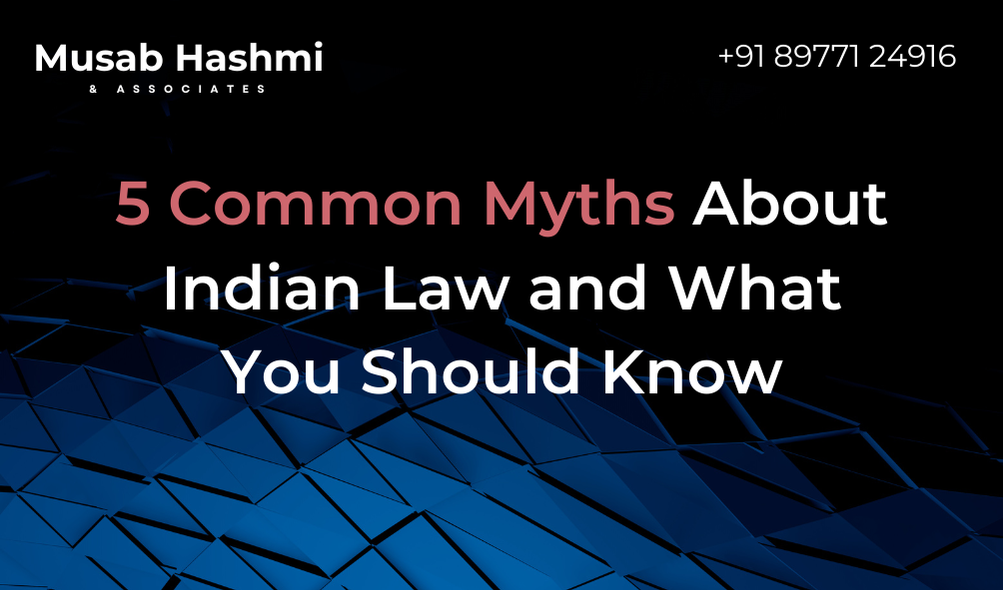Indian law, like the laws of any country, can often seem complex and difficult to navigate. As a result, there are many misconceptions about the Indian legal system that can mislead individuals when they are faced with legal challenges. These myths can lead to confusion, costly mistakes, and missed opportunities for justice. It is essential for everyone to understand the truth about Indian law to make informed decisions and protect their rights.
In this blog, we will debunk some of the most common myths about Indian law and provide the clarity needed to understand the legal system better.
1: Only the Rich Can Afford Legal Help in IndiaOne of the most prevalent myths is that legal services are prohibitively expensive and only the wealthy can afford them. While it's true that legal services can be costly in certain cases, the reality is that there are affordable options available for people at all income levels.
The Truth:
India's legal system includes a number of provisions for affordable legal aid. The Legal Services Authorities Act, 1987 allows for the provision of free legal aid to individuals who cannot afford legal representation. Additionally, many lawyers provide pro bono services to those in need, and government-run legal aid centers help provide access to justice for the economically disadvantaged.
Moreover, the rise of digital platforms like MusabHashmi.com is making legal services more accessible to the general public, with options for transparent pricing and easy access to legal advice.
2: Criminal Cases Always Take Years to ResolveMany people believe that criminal cases in India take an eternity to resolve, which often discourages individuals from pursuing legal action. This belief stems from the backlog of cases in courts and the long delays in the judicial process.
The Truth:
While the judicial system in India does face delays, not all criminal cases take years to resolve. Certain cases, especially those involving urgent matters, can be expedited under special circumstances. The Fast Track Courts set up by the Indian government aim to speed up the trial process for specific types of cases, such as those related to sexual offenses, and domestic violence.
Furthermore, alternative dispute resolution mechanisms like mediation and arbitration can sometimes offer quicker resolutions than traditional courtroom procedures, especially in civil matters.
3: A Will Is Only for the RichThere is a common misconception that only wealthy individuals need to make a will. This myth is particularly prevalent in India, where many people may feel they do not need a will if they don't have significant assets or property.
The Truth:
A will is an important legal document for everyone, regardless of their wealth. It ensures that your assets are distributed according to your wishes after your death, avoiding disputes among family members. Without a will, the distribution of assets will follow the laws of succession, which may not reflect your intentions. A will can provide peace of mind for you and your family, ensuring that your loved ones are taken care of and your assets are distributed as you desire.
Creating a will is simple and cost-effective, and it helps avoid unnecessary conflicts in the future.
4: You Cannot Contest a Will if You Are Not a BeneficiaryMany people believe that if they are not named in a will, they cannot contest it, even if they feel that the will is unfair or forged.
The Truth:
Indian law allows individuals who are not named as beneficiaries in a will to contest it under certain circumstances. For instance, if someone believes the will was created under undue influence or if the person making the will was not of sound mind, they can challenge the will in court.
The Indian Succession Act, 1925 governs the execution and probate of wills in India, and anyone who believes they have been unfairly excluded can file a petition in the relevant court. Courts will look into issues such as the authenticity of the will, the mental capacity of the testator, and whether the will was made voluntarily.
5: Only Men Have Rights in Property MattersIn traditional Indian society, there has been a misconception that only men have the right to own and inherit property. This has led to a lack of awareness about women’s legal rights when it comes to property matters.
The Truth:
Indian law has evolved significantly in recent years, particularly with regard to property rights. The Hindu Succession Act, 1956 was amended in 2005 to grant daughters the same rights as sons in ancestral property. Similarly, under the Indian Succession Act, women are entitled to inherit property from both their parents and their spouses.
Even in Muslim and Christian communities, women have rights to inheritance. The Muslim Personal Law allows women to inherit property from their parents, though the share is typically half of that of a male heir. In Christian law, women can inherit property on equal terms with male heirs.
The belief that women do not have equal rights to property is outdated and inaccurate. It is important for both men and women to understand their legal rights when it comes to property ownership and inheritance.
ConclusionMyths and misconceptions about Indian law can be dangerous, as they lead to confusion and potentially prevent people from seeking justice or protecting their rights. Understanding the legal landscape is essential, and dispelling these myths is the first step towards gaining confidence in the legal system.
Remember, whether you are dealing with property matters, a criminal case, or drafting a will, legal advice can help clarify your rights and options. The law exists to ensure fairness and justice for all, and knowing the truth about Indian law empowers individuals to make informed decisions.
Disclaimer: This article is for general awareness. For specific legal concerns, consult a qualified legal professional.
